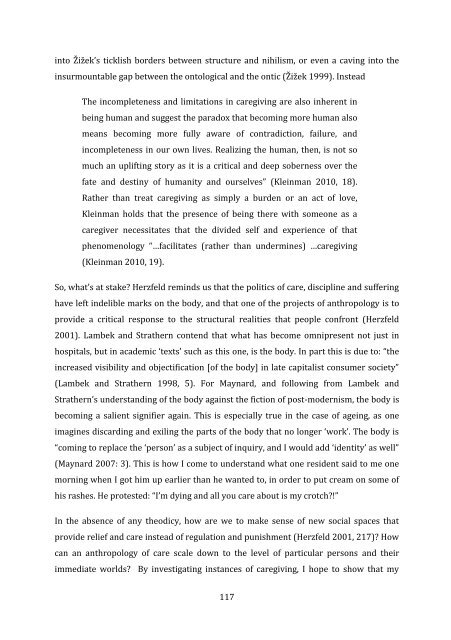Philip Y. Kao PhD thesis - Research@StAndrews:FullText
Philip Y. Kao PhD thesis - Research@StAndrews:FullText
Philip Y. Kao PhD thesis - Research@StAndrews:FullText
Create successful ePaper yourself
Turn your PDF publications into a flip-book with our unique Google optimized e-Paper software.
into Žižek’s ticklish borders between structure and nihilism, or even a caving into the<br />
insurmountable gap between the ontological and the ontic (Žižek 1999). Instead<br />
The incompleteness and limitations in caregiving are also inherent in<br />
being human and suggest the paradox that becoming more human also<br />
means becoming more fully aware of contradiction, failure, and<br />
incompleteness in our own lives. Realizing the human, then, is not so<br />
much an uplifting story as it is a critical and deep soberness over the<br />
fate and destiny of humanity and ourselves” (Kleinman 2010, 18).<br />
Rather than treat caregiving as simply a burden or an act of love,<br />
Kleinman holds that the presence of being there with someone as a<br />
caregiver necessitates that the divided self and experience of that<br />
phenomenology “…facilitates (rather than undermines) …caregiving<br />
(Kleinman 2010, 19).<br />
So, what’s at stake? Herzfeld reminds us that the politics of care, discipline and suffering<br />
have left indelible marks on the body, and that one of the projects of anthropology is to<br />
provide a critical response to the structural realities that people confront (Herzfeld<br />
2001). Lambek and Strathern contend that what has become omnipresent not just in<br />
hospitals, but in academic ‘texts’ such as this one, is the body. In part this is due to: “the<br />
increased visibility and objectification [of the body] in late capitalist consumer society”<br />
(Lambek and Strathern 1998, 5). For Maynard, and following from Lambek and<br />
Strathern’s understanding of the body against the fiction of post-modernism, the body is<br />
becoming a salient signifier again. This is especially true in the case of ageing, as one<br />
imagines discarding and exiling the parts of the body that no longer ‘work’. The body is<br />
“coming to replace the ‘person’ as a subject of inquiry, and I would add ‘identity’ as well”<br />
(Maynard 2007: 3). This is how I come to understand what one resident said to me one<br />
morning when I got him up earlier than he wanted to, in order to put cream on some of<br />
his rashes. He protested: “I’m dying and all you care about is my crotch?!”<br />
In the absence of any theodicy, how are we to make sense of new social spaces that<br />
provide relief and care instead of regulation and punishment (Herzfeld 2001, 217)? How<br />
can an anthropology of care scale down to the level of particular persons and their<br />
immediate worlds? By investigating instances of caregiving, I hope to show that my<br />
117
















